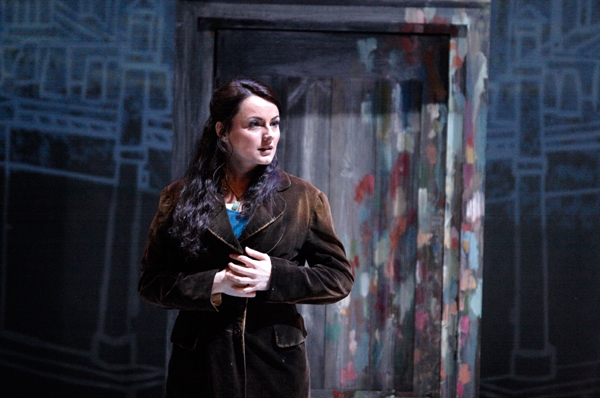Welsh National Opera’s new production of La Bohème, which I saw last week in Birmingham, is striking in a variety of ways, but its outstanding feature is the conducting of Carlo Rizzi. One tends to think that of all operas Bohème can look after itself, and up to a point that is true. Bashed out metronomically on a pub piano, or dispersed underneath the arches at Waterloo, or most absurdly of all made into a DVD and set in ‘real’ locations, with actual snow falling, it remains inviolate, though that isn’t perhaps the first word to use in connection with anything Puccinian.
Yet every now and then it gets the royal treatment, and how much more satisfying it is when it does. There wasn’t a bar that Rizzi hadn’t considered, not in order to do something different, but to reveal his love of the work. After one has been to a fair number of performances of Bohème, it’s easy to feel that the opening 20 minutes of banter, the arrival and enforced departure of the landlord Benoit in particular, is little more than the upbeat to what really matters, Puccini’s first earth-shifting love scene — the one in Manon Lescaut is fine, but not in this class. The richness of orchestral detail and the rhythmic and melodic vitality of the score came into new focus with Rizzi. A few weeks ago at the Royal Opera, Semyon Bychkov presented the work to us in great symphonic arches, but Rizzi moved it closer to Verdian drama, where he is most at home.
The settings are odd, neither quite inside nor outside, and with large silvery-mirror slats at the sides. There are lots of projections, some of them surprisingly cosmic for Bohème. When Mimì enters, she does a complete tour of the wall-less stage, knocking at a door just behind Rodolfo, whom she has just walked past. The furniture, sparse as it is, of Act I remains for the middle acts. But in the present climate of stage direction and setting, it is probably pathetic to notice such things.
The casting is of a standard to do credit to any opera house, though many of the names are not yet familiar. Alex Vicens, a Spaniard and the Rodolfo, has rather a tight voice, but he managed the climaxes in his Act I aria superbly, and he is a capable actor. Mimì was the more obviously starry Anita Hartig, a Romanian, who imparted a dignity to the role that made the last two acts even more painful. She and Vicens, with the strong backing of David Kempster’s Marcello and Kate Valentine’s Musetta, made the great contrasting passions of Act III as powerful as I have known them in the theatre. Every company needs a good Bohème to see it through a couple of recessions, and WNO certainly has one here.
I saw the long-lived production of Tristan and Isolde, as WNO insists on calling it, despite its being in German, a month ago. The cast was the same here, with the exception of the last act, where Anna-Katharina Behnke took over from Ann Petersen, who succumbed finally to an allergy. Petersen had sung the first two acts even more strongly than she did in Cardiff, with a coruscating Narrative and curse. Yet somehow those acts, though every ingredient was at least satisfactory and mostly much more, failed to sweep us along and away as Tristan must.
The most moving part of them, as so often, was the last 25 minutes of Act II, Matthew Best an anguished and eloquent Marke, Ben Heppner inward and poignant in his plea to Isolde to follow him to the Wonderland of Night. And in the end it was Heppner who made the performance unforgettable. His voice was stronger than it was in Cardiff, he seemed more confident of taking risks, many of which paid off, though he also seemed to have learnt that it is dangerous to sing very quietly. In Act III, which Charles Rosen, in his magnificent new book Freedom and the Arts, describes as ‘perhaps the most remarkable dramatic sequence of any operatic creation’, Heppner rose to and sustained greatness; it’s a terrible pity that there has to be a cut in his first outpouring of torment, but having swallowed that bitter pill, I was overcome with Heppner’s identification with the role, and with his capacity to shape the succession of increasingly violent climaxes after Isolde’s ship has failed to appear. It might have made Rosen drop his ‘perhaps’.
When Isolde no.2 did arrive, she looked as fine as the first one, but her voice is rasping, already paying the price for too many early Elektras. The Liebestod was restrained, but the ravishing beauty of the orchestral accompaniment was revealed.
The WNO orchestra was, from start to finish, on its finest form, and Lothar Koenigs, who believes in letting things rip, also exposed many more details in the score. Wagner indicates that Isolde is ‘as if transfigured’ at the end. That’s how I felt.






Comments